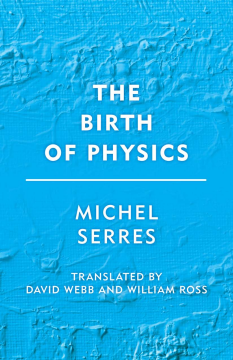
Additional Information
Book Details
Abstract
The Birth of Physics represents a foundational work in the development of chaos theory from one of the world’s most influential living theorists, Michel Serres.
Focussing on the largest text still intact to reach us from the Atomists - Lucretius' De Rerum Natura - Serres mobilises everything we know about the related scientific work of the time (Archemides, Epicurus et al) in order to demand a complete reappraisal of the legacy. Crucial to his reconception of the Atomists' thought is a recognition that their model of atomic matter is essentially a fluid one - they are describing the actions of turbulence, which impacts our understanding of the recent disciplines of chaos and complexity. It explains the continuing presence of Lucretius in the work of such scientific giants as Nobel Laureates Schroedinger and Prigogine.
This book is truly a landmark in the study of ancient physics and has been enormously influential on work in the area, amongst other things stimulating a more general rebirth of philosophical interest in the ancients.
Webb and Ross have provided us with an elegant and idiomatic new translation of one of Michel Serres’s most timely and revolutionary books, allowing English readers to experience the extraordinary power and seductive quality of the Serresian idiom. It is my expectation and hope that their excellent work will open the riches of this important text to a new generation of Anglophone scholars.
Chris Watkin, Monash University, Australia
This long-awaited translation will change the way we think about materialism, and about the relationship between thought and life. Vortices, declinations, flows: the atoms of ancient physics have all the life and vibrancy that the twenty-first century often thought it was discovering in its new materialism. The history of ideas and life alters dramatically - and for the better - if we take Serres’s thought seriously. Atoms are not static building blocks but deviating forces, and the birth of physics was a moment of wild difference if only we read Lucretius with the keen eye that Serres offers.
Claire Colebrook, Edwin Erle Sparkes Professor of English, Penn State University
Michel Serres is a Professor in the History of Science at Stanford University and a member of the Academie Francaise.
Table of Contents
| Section Title | Page | Action | Price |
|---|---|---|---|
| The Birth of Physics | Cover | ||
| Contents | v | ||
| Preface | vii | ||
| Introduction | 1 | ||
| 1 Protocol | 21 | ||
| First Model: Declination in a Fluid Milieu | 21 | ||
| Turbulence | 24 | ||
| 2 Mathematics | 27 | ||
| Analysis of the Hydraulic Model | 27 | ||
| The Work of Archimedes | 32 | ||
| Archimedes on Thinking Deviation | 37 | ||
| 3 Return to the Model | 47 | ||
| Turba, Turbo | 47 | ||
| Slope and Extrema | 52 | ||
| Flows and Paths | 70 | ||
| 4 Experiences | 89 | ||
| The Meteōra | 89 | ||
| Experimentation: Magnetism | 113 | ||
| 5 Conditions | 125 | ||
| Epistemological Conditions | 125 | ||
| Cultural Conditions | 132 | ||
| 6 Application: Genesis of the Text | 163 | ||
| Atoms, Letters, Cipher | 168 | ||
| The Genesis of Sense | 173 | ||
| Coding | 176 | ||
| Fall and Rhythm | 179 | ||
| 7 History | 189 | ||
| Antiquity, Modernity | 189 | ||
| 8 Morality | 197 | ||
| The Soul and the Descent into the Underworld | 197 | ||
| The Garden and the Local | 205 | ||
| Index | 227 | ||
| About the Author | 233 |
